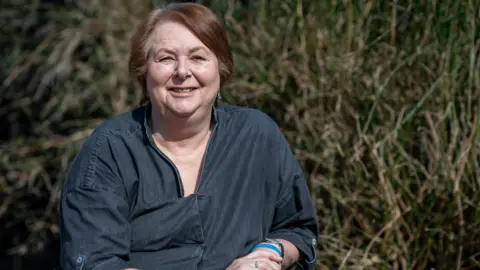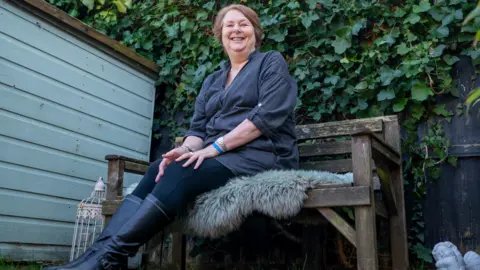Divorce stress wrongly blamed for MND symptoms
 PA Media
PA MediaA woman whose motor neurone disease (MND) symptoms were initially mistaken for stress from her divorce has been given five years to live - but says it's "not the end".
Diana Keys, 65, from Clevedon in Somerset, said that a year after her 35-year marriage ended in 2019, her speech deteriorated and she started "falling over for no reason".
She sought medical advice and testing, with one consultant believing her symptoms were due to stress from her divorce.
But in May 2023 she was diagnosed with MND, which causes progressive muscle weakness and is incurable.
Doctors told her prognosis was between two and five years.
Her condition affects her mobility and speech and leaves her "struggling" to complete simple tasks such as cooking, carrying a cup of tea and taking her credit card out of her purse.
Diana says she is "passionate" about raising awareness of the disease - particularly among women.
"I keep looking for a sell-by date code on me, but there isn't one, so I just keep going," said Diana, who is a grandmother.
"I can be a glass-half-empty person sometimes but, since my diagnosis, I've tried not to bring other people down – I try to be stoic.
"I try to keep a sense of humour and count my blessings, so I've got a lot to live for."
 PA Media
PA MediaMND is a rare condition which progressively damages parts of the nervous system and leads to muscle weakness.
It is usually life-shortening and there is no cure, but treatment can manage the symptoms, which can include stiff or weak hands, weak legs and feet, and twitches, spasms or muscle cramps.
Falls in the bathroom
After Diana and her husband divorced in 2019, she said she started falling over.
"I fell over in the bathroom and hit my head in the shower and, after that happened two or three times, I contacted the GP," she said.
Diana's GP referred her to a consultant neurologist where she underwent electromyography (EMG), which measures the electrical activity in the muscles.
She said the consultant thought her symptoms were just stress after her divorce, but she "knew that wasn't the case".
After then experiencing fasciculation (muscle twitching) and noticing her voice was deteriorating, she pushed for further testing.
"I've always been a very positive person. I've suffered from depression, so I know how that feels, and the issues I was having were physical," she said.
In May 2023, three years after her symptoms started, Diana was told she had MND.
She said she found her diagnosis difficult to accept
"I remember the consultant just saying, 'There is no cure, and the prognosis is between two and five years."
Having moved into a bungalow soon after the divorce, Diana, now retired, has not had to make too many alterations to her home.
Her garden has been landscaped for accessibility and safety, with help from the Motor Neurone Disease Association, and she is looking to widen her door frames to accommodate a wheelchair in future.
'A new journey'
She said the fatigue is huge, her voice is slurred and her mobility is "wobbly", and a simple task such as carrying a cup of tea into the lounge from the kitchen is hard.
She said: "I love cooking for family and having friends around for meals – I can't do that now.
"Socially, it's been hard because it takes a lot of effort to speak and walk – all the normal things – and I had to have my hair cut because I couldn't manage to style it properly."
"My progression is relatively slow, so I'm hoping that I'll get as long as I can," she said.
"Once you've got a diagnosis, something as traumatic as Motor Neurone Disease, it's not the end, it's the beginning of a new journey."
Follow BBC Bristol on Facebook, X and Instagram. Send your story ideas to us on email or via WhatsApp on 0800 313 4630.
